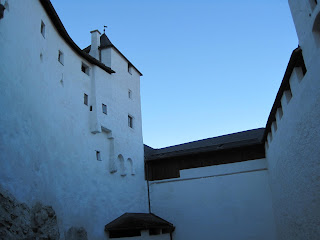Last night, I went to see American Passages, the new film by Austrian documentary film director Ruth Beckermann at the Votivkino in the first district with the 7th form (juniors) Wahlpflichtfach (English elective class). All the girls (there are only girls in this class) were late, buying popcorn at the concession stand, trudging into the theater after the lights had dimmed and the previews started, sloughing off their winter gear in the row behind me, reserved just for them.
The film we were set to watch was about the American dream, I suppose. Or the inverse-American dream. As a whole, the film had little storyline, not much to connect images to dialog, aside from the fact that the interviews collected from around the United States served as the common denominator. The interviewees were of diverse cultural backgrounds, many of them underprivileged or part of the minority somehow. Pans of Harlem residents celebrating Barack Obama's 2008 presidential win, a bride-to-be in Mississippi telling the audience how she and her husband met, a gay couple living in Arizona explaining how they came to adopt a set of twins and a former pimp and compulsive gambler at the roulette table of a Las Vegas casino all take part in the aural and visual melange Beckermann gives us. The names are not given - just the stories and the circumstances in which they came about. The footage is coherently edited and flows from picturesque landscapes to portraits of denizens, but the stories seem dislocated, abstract, aborted, unfulfilled. Scattered. It is never fully explained who these people are - why they are important. They are all Americans. I suppose in its way, that is enough.
On Beckermann's part, I felt a very skewed version of reality confronting me from the silver screen. A one-sided commentary on the United States from an Austrian: a foreigner who has had little other, actual cultural contact with the USA. I couldn't help but feel her lack of objectivity on the subject not only prejudicial but lacking in professionalism. Displaying each side of the American story coherently and without injecting her own preconceived notions of what she expected to find seemed absent to me. The "documentation" was not unbiased.
My discomfort with the portrayal of Americans was perhaps underscored by the audience. As a scene of a Memorial Day celebration in Mississippi took up the screen, a woman sang the Star Spangled Banner and, upon saying a few words about the armed services - men and women who make the ultimate sacrifice for their country - she began to cry at the podium. Snickering began in the theater, and in some cases, I'm sure I heard full-blown laughter.
Perhaps she has lost a loved one in Iraq or Afghanistan. Perhaps she loves her country so much, her empathy overwhelmed her. Perhaps it was just too stinking hot on that May day in Mississippi that she couldn't keep her emotions in check. Because it was not explained, we will never know. Despite why she began to cry, it is to me unfathomable that her reaction should be mocked and ridiculed. This woman, in giving respect to her country and the US Armed Forces deserves respect in return.
This may sound hypocritical, and on some level it probably is. Before I spent any considerable amount of time abroad, I was an America-hater, too. It was a pretentious and rather ugly form of self-hate that I hope I've grown out of. Yes, I hate the wars in Iraq and Afghanistan. I hate that all of (what I perceive to be) the bad aspects of American culture (junk food, SUVs and unchecked consumerism being high on this list) have been exported to Europe, and lauded by young Europeans. I hate that non-Americans assume the United States does not have or has not produced anything worthy of the title "culture" but I now realize that, as an American, I am not defined by what my country does or is, unless this is what I allow. I, one person, am not responsible for 300 million. Perhaps the president is, but I am not. I can hate things about America, but I cannot hate being an American. What else do I have?
I've heard from many Austrians that they don't understand American patriotism. They don't have any idea why a person would sport the Stars and Stripes on a t-shirt or bumper sticker, why they would send care packages to the overseas troops. Or why the Pledge of Allegiance must be recited every day in school. I can't exactly explain it myself, but I do think that there's nothing wrong with loving one's country, and being proud to be where you're from.
Xenophobia and dogmatic patriotism are not all right, but most Americans, including the woman who was filmed, are not crazy patriots or bigots because they commemorate the soldiers who served in any war for their country. And since the equivalent of First Amendment rights came so much later to Austria, it's no wonder to me that there's a cultural gap - that freedom is inherent to the human condition, and that it can - by definition - safely mean two different things to two different people.























































